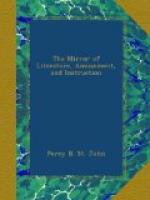When the lauchin’ had a wee subsided, Mr. Campbell, in order to show that he had nae ill wull to Mr. Weft, ax’d his pardon for the rough way he had treated him, but the worthy manufacturer wadna hear o’t. “Houts, man,” quo’ he, “dinna say a word about it. It’s a mistak a’thegether, and Solomon himsell, ye ken, whiles gaed wrang.” Whereupon the Heelandman bought a Kilmarnock nichtcap, price elevenpence happeny, frae Mr. Weft, and paid him wi’ part of the very note that brocht on the ferly I hae just been relating. But his gude wull didna end here, for he insisted on takin’ us a’—Nosey amang the lave—to the nearest public, where he gi’ed us a frien’ly glass, and we keepit tawking about monkeys, and what not, in a manner at ance edifying and amusing to hear.—Blackwood’s Magazine.
* * * * *
SCOTCH SONG.
The lassie we love and the friend we can
trust,
And a bumper to wash from our spirits
the rust;
Then let gear-scraping carls make o’
life catch-the-plack,
And strod to the de’il wi’
the trash on their back.
This life is a garden where all choose
their posies:
In the spring of our youth let us gather
the roses;
For brief is their bloom like the dews
of the morn,
If you seek them too late you will find
but a thorn.
If Care steal amang us he’s narrowly
watch’d,
By a smile or a squeeze of the hand he’s
dispatch’d;
Or the arm of a friend should the stout
villain meet,
One blink of true love lays him dead at
your feet.
Then fill up a glass to the absent and
dear—
May their lives be serene as their breasts
are sincere;
And to crown our true bliss, let us give,
ere we part—
May we have in our arms whom we love in
our heart.
London Weekly Review.
* * * * *
THE SKETCH-BOOK.
No. XLVII.
MATCHES IN TEENS.
“To marry!—Why,
every man plays the fool once in his
life—but to marry
is playing the fool all one’s life
long.”—CONGREVE.
There is something so satisfactory in knowing at once the limit of your fortunes—in making yourself secure in the first instance of that happiness to which all your exertions are directed,—which is in fact the end and aim of your worldly existence, and of all your worldly toils—the enjoyment of domestic peace and love;—in quenching that restless, burning anxiety, which is ever busy within the bosom of the young and the aspiring. Marrying early, in fact, is taking time by the forelock, and leading your future destinies after you, instead of suffering yourself to be led and tossed about by them,—it is tearing away the black veil from the brow of futurity, and perusing all her lineaments in her own despite. It is [he continued with an oratorical attitude] building your fate upon a rock—”




